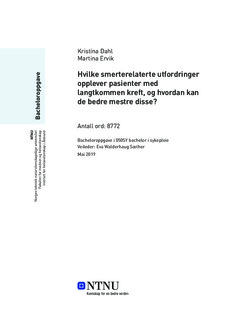| dc.contributor.advisor | Walderhaug Sæther, Eva | |
| dc.contributor.author | Dahl, Kristina | |
| dc.contributor.author | Ervik, Martina | |
| dc.date.accessioned | 2019-09-06T14:10:48Z | |
| dc.date.available | 2019-09-06T14:10:48Z | |
| dc.date.issued | 2019 | |
| dc.identifier.uri | http://hdl.handle.net/11250/2613516 | |
| dc.description.abstract | Hensikt: Studiens hensikt var å belyse hvilke smerterelaterte utfordringer pasienter med langtkommen kreft opplever, og hvordan de bedre kunne mestre de.
Metode: Dette er en systematisk litteraturstudie. Ti artikler er inkludert, ni kvalitative og én kvantitativ.
Resultat: Funnene viser at smerte er en individuell opplevelse, og førte til redusert fysisk kapasitet og ga psykiske påkjenninger. Pasientene hadde bekymringer knyttet til avhengighet og bivirkninger fra analgetika. Pasientene syntes det var viktig å være selvstendig i smertebehandlingen, og de benyttet seg av ikke- farmakologiske tiltak. Pasientene hadde behov for å få kunnskap om analgetika og informasjon om årsaken til smertene. Samtidig som de hadde behov for å bli møtt med omsorg og tillit fra helsepersonellet.
Konklusjon: Sykepleieren bør benytte seg av smertevurderingsskjema i den individuelle tilnærmingen til pasienten, og rette tiltak mot pasientens behov og ressurser. En viktig sykepleierolle er å fremme håp, og å motivere pasienten til å bruke egne ressurser. Pasienten kan veiledes i bruken av ikke-farmakologiske tiltak, som kan bidra til økt følelse av håndterbarhet. Informasjon er sentralt for pasientens opplevelse av kontroll og selvhjulpenhet, og sykepleier må blant annet informere om effekten av analgetika. Relasjonen til pasienten er viktig i smertehåndteringen, og den bør være preget av omsorg og gjensidig tillit. Palliativ plan kan være et hjelpemiddel som kan bidra til økt livskvalitet og trygghet hos pasienten.
| |
| dc.description.abstract | Aim: The aim of this bachelor thesis was to explore which pain-related challenges patients with advanced cancer experience, and how they could better cope with these.
Method: This is a systematic literature review. Ten articles are included, nine qualitative and one quantitative.
Results: The findings in this study reveal that pain is a subjective experience. The pain reduced their physical capacity and caused psychological distress. The patients had concerns about addiction and side effects from the analgesia. The patients wanted to be independent in the management of their pain and had non-pharmacological approaches. Patients had a need for knowledge regarding the analgesics, and information about what was causing their pain. They also wished to be met by caring and trustworthy health professionals.
Conclusion: Nurses should apply the use of pain assessment tools in the individual approach to the patient, and target the patients’ needs and resources when planning strategies. The nurse has an important role to play in boosting the patients hope, and in encouraging the patient to use their own resources. The patient can be guided in the use of non-pharmacological strategies, and this can strengthen the patients feeling of manageability. Information plays a crucial part in the patients’ experience of control and self-reliance, and the nurse must inform about the effects of the analgesics. The partnership with the patient is important in the management of pain, and should be characterized by caring abilities and mutual trust. A palliative plan can be a useful tool, which can increase quality of life and safety for the patient.
| |
| dc.language | nob | |
| dc.publisher | NTNU | |
| dc.title | Hvilke smerterelaterte utfordringer opplever pasienter med langtkommen kreft, og hvordan kan de bedre mestre disse? | |
| dc.type | Bachelor thesis | |
